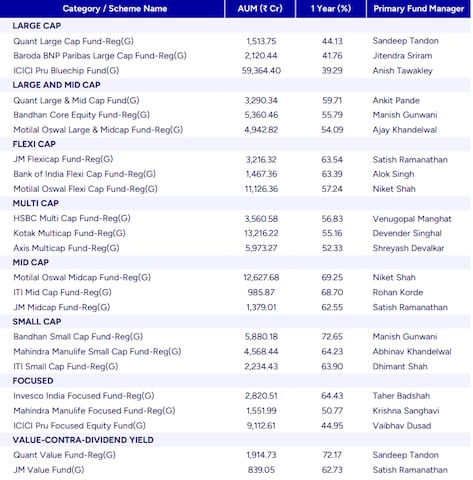Equity mutual funds have delivered stellar returns over the past one year despite facing volatility in the short term. According to a study by PL Capital, the wealth management arm of Prabhudas Liladhar, the overall equity mutual fund category generated a commendable return of 42% over the past one year. Midcap and smallcap funds emerged as the best performers, generating returns of 51.36% and 47.37% respectively, over the past one year. These categories have consistently outperformed the broader market.
While not as spectacular as their mid- and small-cap counterparts, large-cap funds generated returns of 32.85% last year, demonstrating their resilience during market fluctuations.
These are the best performing mutual funds in the last year
Large-cap funds Large-cap funds remain a favourite among investors and several schemes offer exceptional returns. Large-cap funds invest predominantly in large-cap stocks. Schemes must invest between 80% and 100% of their equity in the same amount.
the large-cap equity portfolio, as defined by Sebi.
Quant Large Cap Fund topped the charts with a return of 44.13%, closely followed by Baroda BNP Paribas Large Cap Fund with 41.76%.
With a total assets under management (AUM) of Rs 3,460,820 crore, the large-cap fund category has attracted substantial investor interest. These funds have consistently generated returns of 4.3%, 18.3% and 32.8% over the one-month, six-month and one-year periods, respectively.
Best mutual funds: one-year returns

Brilliance of mid- and small-cap companies
Motilal Oswal Midcap Fund led the way with a staggering return of 69.25%, demonstrating the potential of this category. Midcap funds, which invest predominantly in mid-sized companies, generated an annual return of 51.36%, significantly outperforming the benchmark by 3.99%. This highlights the potential of mid-sized companies to drive growth and create wealth for investors.
However, the performance of mid-cap funds has been mixed in the short term. While 11 of the 29 funds managed to outperform the benchmark in the past month, the number of outperforming funds rose to 24 in the six-month period.
Small-cap funds invest predominantly in small-cap stocks. The funds invest a minimum of 65% of assets in small-cap stocks as defined by SEBI. Over the past year, small-cap funds generated a return of 47.37%, which while substantial, underperformed the benchmark by a significant margin of 16.53%. This underperformance highlights the volatility inherent in the small-cap space.
Furthermore, the category has struggled to outperform the benchmark over both the one-month and six-month periods. Only two of the 24 funds managed to outperform the benchmark over the past year, highlighting the challenges faced by fund managers in this segment.
In the smallcap space, Bandhan Small Cap Fund emerged as the best performer with a return of 72.65%.
Flexi Cap and Multi Cap Flex
Flexicap and multi-cap funds, known for their flexibility in asset allocation, also performed well. JM Flexicap Fund and HSBC Multi Cap Fund stood out with impressive returns of 63.54% and 56.83%, respectively.
Flexi Cap funds invest in large, mid and small cap stocks as per SEBI guidelines. They maintain 65% to 100% equity exposure.
Over the past month, only 13 of the 39 flexible-cap funds managed to outperform their benchmark. However, performance improved over longer periods: 22 and 16 funds outperformed over the six-month and one-year periods, respectively.
The category as a whole has delivered returns of 3.91%, 20.30% and 37.95% over the one-month, six-month and one-year periods respectively. While these returns are respectable, they lag behind the broader market, represented by the Nifty 500 index, which delivered returns of 4.39%, 19.52% and 39.15% over the corresponding periods.
Multi-cap funds invest 25% in large-cap stocks, 25% in mid-cap stocks and 25% in small-cap stocks as per SEBI guidelines. They must have 75% equity exposure at all times. The remaining 25% is at the discretion of the fund manager.
With a total asset under management (AUM) of Rs. 1,54,102 crore, the category has garnered significant interest from investors.
Over the past year, multi-cap funds generated a return of 43.48%, outperforming the benchmark by a margin of 1.71%.
While the category has shown strength over the long term, it is important to note that the one-month return of 4.62% was slightly lower than the benchmark’s 4.59%.
Focused and value funds shine
Focused funds, with their concentrated bets, and value funds, which look for undervalued stocks, have also rewarded investors. Quant Value Fund and Invesco India Focused Fund delivered exceptional returns of 72.17% and 64.43%, respectively.
Targeted funds invest in a limited number of stocks (maximum 30) and must invest a minimum of 65% of their assets in stocks, across all market capitalizations. Over the past year, targeted funds generated a return of 34.58%, 4.62% lower than the benchmark index.
Value Funds follow a value/contrarian/dividend yield investment strategy and maintain a minimum investment of 65% in equity.
ELSS: A tax-saving option that offers rewards
Equity Linked Savings Schemes (ELSS) not only offer tax benefits but also generate substantial returns.
ELSSs are allowed to invest between 80% and 100% of their total assets in equities, in any market capitalisation. The funds have a statutory lock-in period of 3 years and offer tax benefits under Section 80C.
Topping the pack is Motilal Oswal ELSS Tax Saver Fund with a stellar return of 59.16%, followed by SBI Long Term Equity Fund with 56.50%. While Bank of India ELSS Tax Saver also delivered a commendable return of 53.84%.
These returns outperform broader market indices including the Nifty 50, which gained 27.84%, and the Nifty 500, which rose 39.15%.
Disclaimer: Past performance is not indicative of future results. Investments in mutual funds are subject to market risks. Please read the scheme information document carefully before investing.
Disclaimer:
The information contained in this post is for general information purposes only. We make no representations or warranties of any kind, express or implied, about the completeness, accuracy, reliability, suitability or availability with respect to the website or the information, products, services, or related graphics contained on the post for any purpose.
We respect the intellectual property rights of content creators. If you are the owner of any material featured on our website and have concerns about its use, please contact us. We are committed to addressing any copyright issues promptly and will remove any material within 2 days of receiving a request from the rightful owner.

